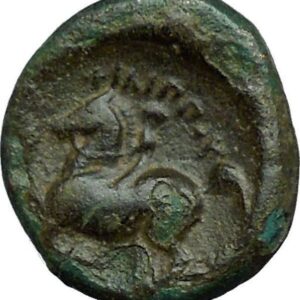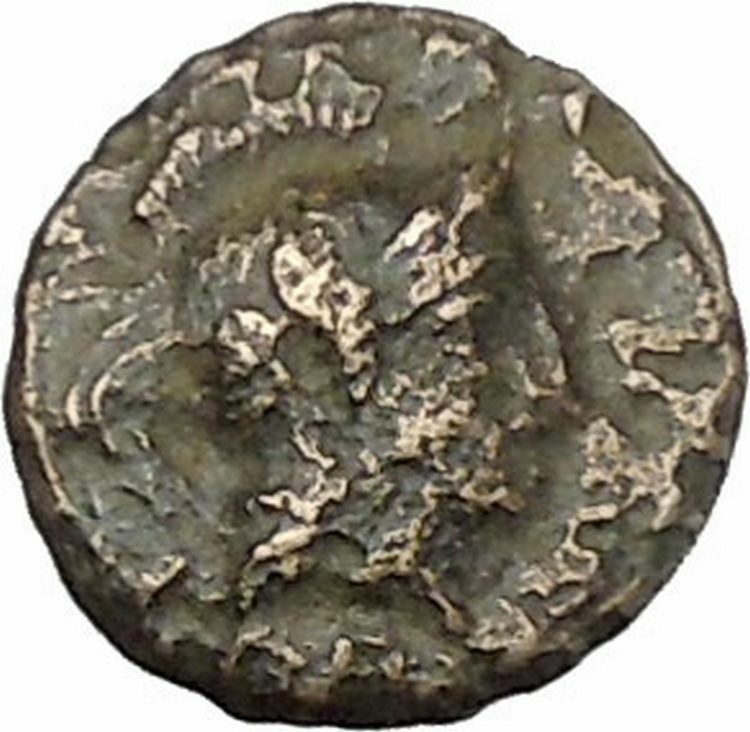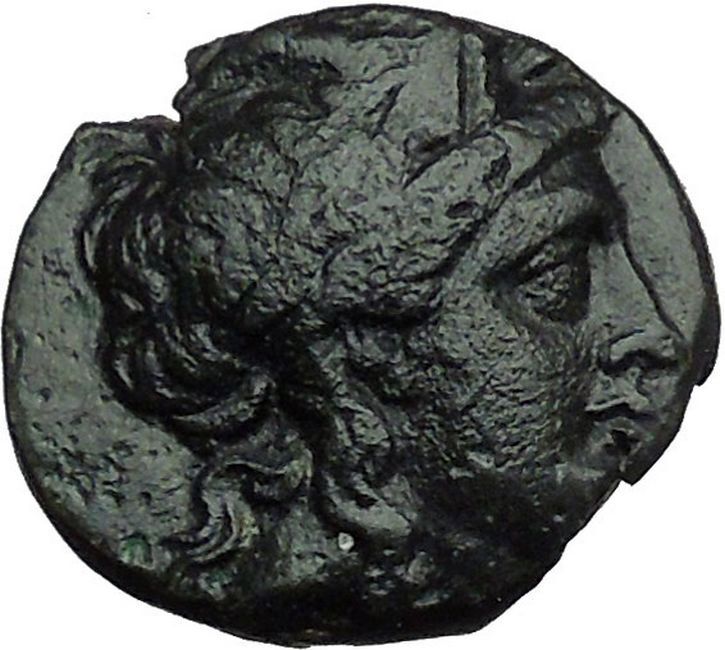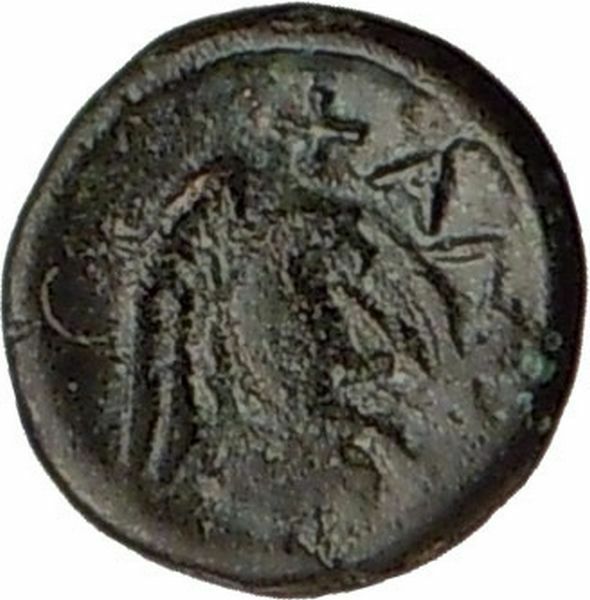|
Greek Coin of Kingdom of <font color="#000000" ioniaThrace
Lysimachos – King: 323-281 B.C.
Bronze 17mm (4.62 grams) Lysimacheia mint. Struck under Kassander, circa 317-305 B.C.
Commemorating Philip II‘s Olympic Games Victory
Reference: Price P3-5 (Philip III); Thompson 2
Head of Apollo right, hair bound with tainia.
Youth on Horse prancing right, ΦIΛIΠΠΟΥ above; ΛΥ below; forepart of lion below horse.
One of the most remarkable of the ‘Successors’ of Alexander the Great, Lysimachos was of Thessalian stock and was a bodyguard of the great Macedonian King. In the confused period following Alexander’s death he obtained the government of Thrace, and in 309 B.C. founded his capital city of Lysimacheia where many of his coins were struck. In 305 B.C. he took the title of King, and four years later extended his rule over much of Asia Minor following the defeat of Antigonos the One-eyed at Ipos. His later years were marred by domestic tragedy and his harsh rule made him unpopular with his subjects. In 281 B.C. Lysimachos, now aged 80, was attacked by Seleukos of Syria who was only two years his junior. Lysimachos died fighting at the Battle of Corupedium and his kingdom disappeared with him. But his memory lived on and generations later a number of mints in the Black Sea area restored his coin types for their autonomous issues.
You are bidding on the exact item pictured, provided with a Certificate of Authenticity and Lifetime Guarantee of Authenticity.
History and Meaning of the Coin
During the times of ancient Greeks, horse racing was one of the events various Greek city-states and kingdoms would have intense competition with each other, as it was of great prestige to participate. Before the time of Philip II, the kingdom of Macedonia was considered barbarian and not Greek. Philip II was the first king of Macedon that was accepted for participation in the event, which was a great honor all in itself. It was an even greater honor that Philip’s horses would go on to win two horse-racing events. In 356 B.C., he won the single horse event and then in 348 B.C. chariot pulled by two horses event. As a way to proudly announce, or what some would say propagandize these honors, Philip II placed a reference to these great victories on his coins struck in all three metals of bronze, silver and gold. The ancient historian, Plutarch, wrote “[Philip of Macedon] … had victories of his chariots at Olympia stamped on his coins.”
 In Greek and Roman mythology, Apollo, is one of the most important and diverse of the Olympian deities. The ideal of the kouros (a beardless youth), Apollo has been variously recognized as a god of light and the sun; truth and prophecy; archery; medicine and healing; music, poetry, and the arts; and more. Apollo is the son of Zeus and Leto, and has a twin sister, the chaste huntress Artemis. Apollo is known in Greek-influenced Etruscan mythology as Apulu. Apollo was worshiped in both ancient Greek and Roman religion, as well as in the modern Greco-Roman Neopaganism. In Greek and Roman mythology, Apollo, is one of the most important and diverse of the Olympian deities. The ideal of the kouros (a beardless youth), Apollo has been variously recognized as a god of light and the sun; truth and prophecy; archery; medicine and healing; music, poetry, and the arts; and more. Apollo is the son of Zeus and Leto, and has a twin sister, the chaste huntress Artemis. Apollo is known in Greek-influenced Etruscan mythology as Apulu. Apollo was worshiped in both ancient Greek and Roman religion, as well as in the modern Greco-Roman Neopaganism.
As the patron of Delphi (Pythian Apollo), Apollo was an oracular god – the prophetic deity of the Delphic Oracle. Medicine and healing were associated with Apollo, whether through the god himself or mediated through his son Asclepius, yet Apollo was also seen as a god who could bring ill-health and deadly plague as well as one who had the ability to cure. Amongst the god’s custodial charges, Apollo became associated with dominion over colonists, and as the patron defender of herds and flocks. As the leader of the Muses (Apollon Musagetes) and director of their choir, Apollo functioned as the patron god of music and poetry. Hermes created the lyre for him, and the instrument became a common attribute of Apollo. Hymns sung to Apollo were called paeans.
In Hellenistic times, especially during the third century BCE, as Apollo Helios he became identified among Greeks with Helios, god of the sun, and his sister Artemis similarly equated with Selene, goddess of the moon. In Latin texts, on the other hand, Joseph Fontenrose declared himself unable to find any conflation of Apollo with Sol among the Augustan poets of the first century, not even in the conjurations of Aeneas and Latinus in Aeneid XII (161-215). Apollo and Helios/Sol remained separate beings in literary and mythological texts until the third century CE.
,_copia_augustea_(23_ac-14_dc)_da_orig._del_II_sec_ac._6141.JPG/220px-Lisimaco_(c.d.),_copia_augustea_(23_ac-14_dc)_da_orig._del_II_sec_ac._6141.JPG) Lysimachus (c. 360 BC – 281 BC) was a Macedonian officer and diadochus (i.e. “successor”) of Alexander the Great, who became a basileus (“King”) in 306 BC, ruling Thrace, Asia Minor and Macedon. Lysimachus (c. 360 BC – 281 BC) was a Macedonian officer and diadochus (i.e. “successor”) of Alexander the Great, who became a basileus (“King”) in 306 BC, ruling Thrace, Asia Minor and Macedon.
Lysimachus was born in 362/361 BC, to a family of Thessalian Greek stock. He was the second son of Agathocles and his wife; there is some indication in the historical sources that this wife was perhaps named Arsinoe, and that Lysimachus’ paternal grandfather may have been called Alcimachus. His father was a nobleman of high rank who was an intimate friend of Philip II of Macedon, who shared in Philip II’s councils and became a favorite in the Argead court. Lysimachus and his brothers grew up with the status of Macedonians; all these brothers enjoyed with Lysimachus prominent positions in Alexander’s circle and, like him, were educated at the Macedonian court in Pella.
He was probably appointed Somatophylax during the reign of Philip II. During Alexander’s Persian campaigns, he was one of his immediate bodyguards. In 324 BC, in Susa, he was crowned in recognition for his actions in India. After Alexander’s death in 323 BC, he was appointed to the government of Thrace as strategos.
Diadochi
In 315 BC, he joined Cassander, Ptolemy I Soter and Seleucus I Nicator against Antigonus I Monophthalmus, who, however, diverted his attention by stirring up Thracian and Scythian tribes against him. In 309 BC, he founded Lysimachia in a commanding situation on the neck connecting the Chersonese with the mainland. He followed the example of Antigonus I in taking the title of king.
In 306/305 BC, he assumed the title of “King”, which he held until his death at Corupedium in 282/1 BC.
In 302 BC, when the second affiance between Cassander, Ptolemy I and Seleucus I was made, Lysimachus, reinforced by troops from Cassander, entered Asia Minor, where he met with little resistance. On the approach of Antigonus I he retired into winter quarters near Heraclea, marrying its widowed queen Amastris, a Persian princess. Seleucus I joined him in 301 BC, and at the battle of Ipsus Antigonus I was defeated and slain. His dominions were divided among the victors. Lysimachus’ share was Lydia, Ionia, Phrygia and the north coast of Asia Minor.
Feeling that Seleucus I was becoming dangerously great, Lysimachus now allied himself with Ptolemy I, marrying his daughter Arsinoe II of Egypt. Amastris, who had divorced herself from him, returned to Heraclea. When Antigonus I’s son Demetrius I renewed hostilities (297 BC), during his absence in Greece, Lysimachus seized his towns in Asia Minor, but in 294 BC concluded a peace whereby Demetrius I was recognized as ruler of Macedonia. He tried to carry his power beyond the Danube, but was defeated and taken prisoner by the Getae king Dromichaetes (Dromihete), who, however, set him free on amicable terms. Demetrius I subsequently threatened Thrace, but had to retire due to a sudden uprising in Boeotia, and an attack from the King Pyrrhus of Epirus.
In 288 BC, Lysimachus and Pyrrhus in turn invaded Macedonia, and drove Demetrius I out of the country. Lysimachus left Pyrrhus in possession of Macedonia with the title of king for around seven months before Lysimachus invaded. For a short while the two ruled jointly but in 285 BC Lysimachus expelled Pyrrhus, seizing complete control for himself.
Later years
Domestic troubles embittered the last years of Lysimachus’ life. Amastris had been murdered by her two sons; Lysimachus treacherously put them to death. On his return, Arsinoe II asked the gift of Heraclea, and he granted her request, though he had promised to free the city. In 284 BC Arsinoe II, desirous of gaining the succession for her sons in preference to Lysimachus’ first child, Agathocles, intrigued against him with the help of Arsinoe II’s paternal half-brother Ptolemy Keraunos; they accused him of conspiring with Seleucus I to seize the throne, and Agathocles was put to death.
This atrocious deed of Lysimachus aroused great indignation. Many of the cities of Asia Minor revolted, and his most trusted friends deserted him. The widow of Agathocles and their children fled to Seleucus I, who at once invaded the territory of Lysimachus in Asia. In 281 BC, Lysimachus crossed the Hellespont into Lydia and at the decisive Battle of Corupedium was killed. After some days his body was found on the field, protected from birds of prey by his faithful dog. Lysimachus’ body was given over to another son Alexander, by whom it was interred at Lysimachia.
|





 In Greek and Roman mythology, Apollo, is one of the most important and diverse of the Olympian deities. The ideal of the kouros (a beardless youth), Apollo has been variously recognized as a god of light and the sun; truth and prophecy; archery; medicine and healing; music, poetry, and the arts; and more. Apollo is the son of Zeus and Leto, and has a twin sister, the chaste huntress Artemis. Apollo is known in Greek-influenced Etruscan mythology as Apulu. Apollo was worshiped in both ancient Greek and Roman religion, as well as in the modern Greco-Roman Neopaganism.
In Greek and Roman mythology, Apollo, is one of the most important and diverse of the Olympian deities. The ideal of the kouros (a beardless youth), Apollo has been variously recognized as a god of light and the sun; truth and prophecy; archery; medicine and healing; music, poetry, and the arts; and more. Apollo is the son of Zeus and Leto, and has a twin sister, the chaste huntress Artemis. Apollo is known in Greek-influenced Etruscan mythology as Apulu. Apollo was worshiped in both ancient Greek and Roman religion, as well as in the modern Greco-Roman Neopaganism.,_copia_augustea_(23_ac-14_dc)_da_orig._del_II_sec_ac._6141.JPG/220px-Lisimaco_(c.d.),_copia_augustea_(23_ac-14_dc)_da_orig._del_II_sec_ac._6141.JPG) Lysimachus (c. 360 BC – 281 BC) was a Macedonian officer and diadochus (i.e. “successor”) of Alexander the Great, who became a basileus (“King”) in 306 BC, ruling Thrace, Asia Minor and Macedon.
Lysimachus (c. 360 BC – 281 BC) was a Macedonian officer and diadochus (i.e. “successor”) of Alexander the Great, who became a basileus (“King”) in 306 BC, ruling Thrace, Asia Minor and Macedon.




